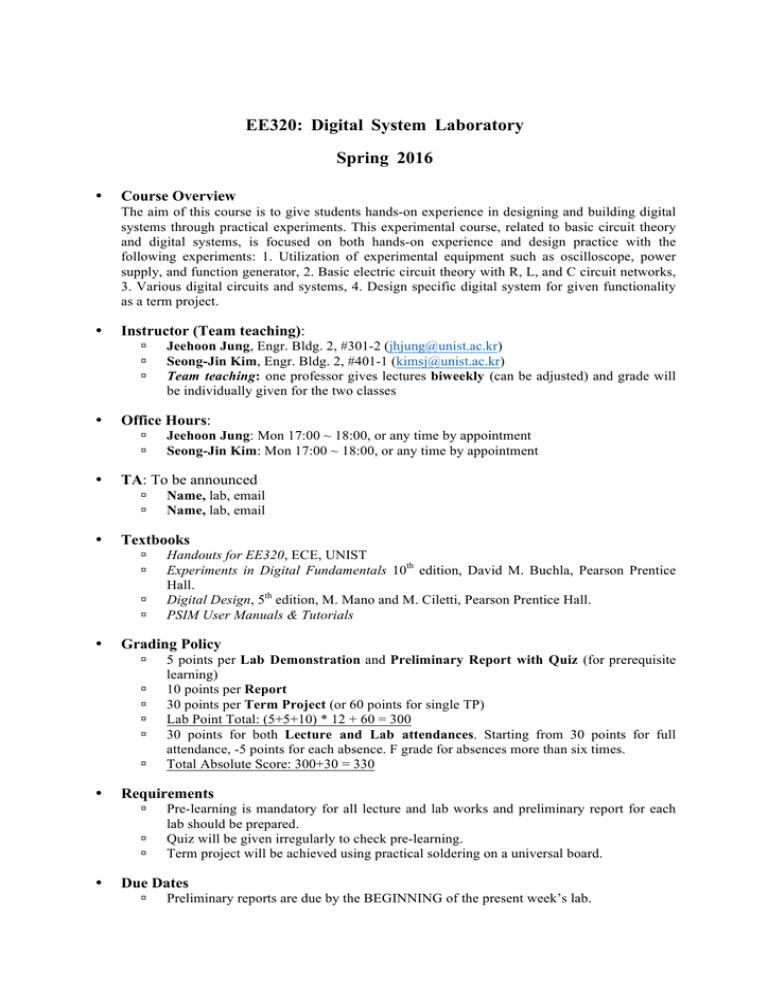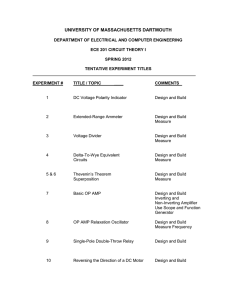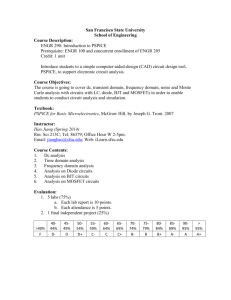
EE320: Digital System Laboratory
Spring 2016
Course Overview
The aim of this course is to give students hands-on experience in designing and building digital
systems through practical experiments. This experimental course, related to basic circuit theory
and digital systems, is focused on both hands-on experience and design practice with the
following experiments: 1. Utilization of experimental equipment such as oscilloscope, power
supply, and function generator, 2. Basic electric circuit theory with R, L, and C circuit networks,
3. Various digital circuits and systems, 4. Design specific digital system for given functionality
as a term project.
Instructor (Team teaching):
ú
ú
ú
Office Hours:
ú
ú
ú
ú
ú
ú
ú
ú
ú
5 points per Lab Demonstration and Preliminary Report with Quiz (for prerequisite
learning)
10 points per Report
30 points per Term Project (or 60 points for single TP)
Lab Point Total: (5+5+10) * 12 + 60 = 300
30 points for both Lecture and Lab attendances. Starting from 30 points for full
attendance, -5 points for each absence. F grade for absences more than six times.
Total Absolute Score: 300+30 = 330
Requirements
ú
ú
ú
Handouts for EE320, ECE, UNIST
Experiments in Digital Fundamentals 10th edition, David M. Buchla, Pearson Prentice
Hall.
Digital Design, 5th edition, M. Mano and M. Ciletti, Pearson Prentice Hall.
PSIM User Manuals & Tutorials
Grading Policy
ú
Name, lab, email
Name, lab, email
Textbooks
ú
ú
Jeehoon Jung: Mon 17:00 ~ 18:00, or any time by appointment
Seong-Jin Kim: Mon 17:00 ~ 18:00, or any time by appointment
TA: To be announced
ú
ú
Jeehoon Jung, Engr. Bldg. 2, #301-2 (jhjung@unist.ac.kr)
Seong-Jin Kim, Engr. Bldg. 2, #401-1 (kimsj@unist.ac.kr)
Team teaching: one professor gives lectures biweekly (can be adjusted) and grade will
be individually given for the two classes
Pre-learning is mandatory for all lecture and lab works and preliminary report for each
lab should be prepared.
Quiz will be given irregularly to check pre-learning.
Term project will be achieved using practical soldering on a universal board.
Due Dates
ú
Preliminary reports are due by the BEGINNING of the present week’s lab.
ú
Lab Operation Policy
ú
ú
ú
ú
ú
Main reports are due by the BEGINNING of the next week’s lab.
If a student has a justifiable reason, he/she can change the lab section temporarily (e.g.,
for one week only) with permission from the involved TAs. It is recommended for the
student to talk in personal to the involved TAs about the desired change at least one day
in advance.
Written reports should be hand-written to discourage plagiarism. Exceptions may be
made in some cases (e.g., the disabled).
Written reports should be in English (exception: person's name).
Late reports should be submitted to the TA in charge.
No food or drink in the lab. Bottled water with its cap closed may be permitted. An
exception to this can be made temporarily by the TA's discretion.
Delay Penalty
ú
ú
One point per day (24 hours) for preliminary reports
Two points per day (24 hours) for lab reports
Announcement and Homework will be given in the Blackboard
Questions? (Blackboard)
ú
Please use the Web Board as much as possible. Questions directly sent by e-mail will be
ignored.
Schedule
Week
Monday
Lab. Contents
Lab #
1
2/29
2
3/7
3
3/14
No class
Intro: Oscilloscope, Laboratory Instrument, and
Measurements of Voltage, Current, Passive Comp.
BCL1: Ohm’s Law and Resistive Circuits
4
3/21
BCL2: Thevenin, Norton, Kirchhoff theorems
3
5
3/28
BCL3: Superposition and Impedance Matching
4
6
4/4
BCL4: Transient Response and Resonance in RLC Circuits
5
7
4/11
DSL1: Number Systems and Logic Gates
6
8
4/18
-
9
4/25
10
5/2
11
5/9
12
13
14
15
16
17
5/16
5/23
5/30
6/6
6/13
6/20
Midterm Exam (No Class)
DSL2: Boolean Laws, DeMorgan’s Theorem, and Logic
Circuit Simplification
DSL3: Adder and Magnitude Comparator
DSL4: Combinational Logic Using Multi and
Demultiplexers
DSL5: D Latch and D Flip-Flop
DSL6: JK Flip-Flop, One-Shots, and Astable Multivibrators
DSL7: Synchronous and Shift Register Counters
Term Project Week (TBD)
Final Exam (Term Project Demonstration)
Term Project Demonstration
None
1
2
7
8
9
10
11
12
TP
TP
TP




